How To Stop American People From Becoming British
“The next time an American ‘mate’ asks you to ‘ring’ her on her ‘mobile’ about renting your ‘flat’ during your ‘holiday,’ it’s fair to ask, have we all become Madonna?”
— If this ever happens, you have our permission to stab your imaginary friend right in the neck, Briton-style.
How To Accidentally 'Invent Liveblogging'
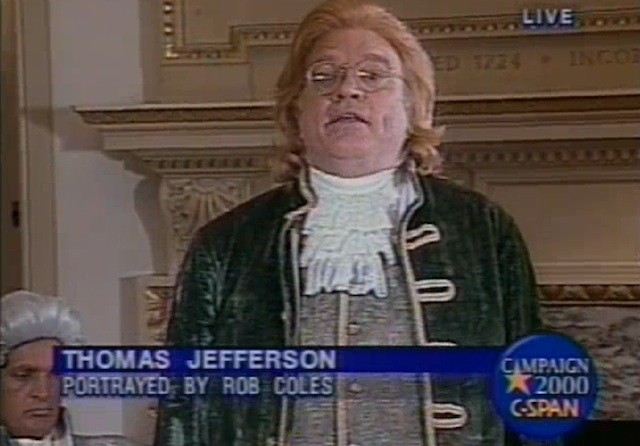
When Joe Biden and Zombie Ayn Rand Paul Ryan begin their televised debate Thursday night, hundreds of professional media employees will be “liveblogging” the proceedings for hundreds of topical websites, from the New York Times to (maybe?) PerezHilton.com. Millions of otherwise sane humans will turn on the television and then frantically reload the websites of their favorite bloggers while simultaneously making their own jokes on Twitter, Facebook and probably in the comments of the aforementioned websites. After digesting and processing thousands of one-liners and spot reactions and weird jokes about the candidates’ genitalia, the now-informed electorate will “pick the best candidate,” which is a fake Big Bird account on Twitter.
The founding fathers, obviously, had exactly this process in mind when they made slavery legal. But political liveblogging did not actually begin with Thomas Jefferson’s giant reptilian tongue lolling around his bound, metal-bikini-clad slave girls. It is a more recent invention — and if I can be believed, then liveblogging as we know it was my accidental invention, three presidential elections ago, all because my employer (a liberal media outlet published by a conservative tycoon’s namesake endowment) didn’t foresee a reason to procure press credentials for my coverage of the Republican National Convention in Philadelphia. Credentials for the Democratic convention in Los Angeles should be enough, right? It wasn’t like George W. Bush was going to defeat Al Gore.
And so, on a terrible rainy evening in a motel at the very edge of Philadelphia, I had no choice but to use the new “Blogger” software on my personal website to write a frequently updated, timestamped collection of cheap jokes and ill-informed instant analysis and then post this disjointed mess on my own “web log,” because of course Annenberg’s Online Journalism Review published its web articles on a strict twice-a-week schedule.

Later, when it was “time to turn on the Internet offset printing press,” the strange and unsavory collection of sentences was posted to OJR.org, an important (forgotten) player in the early days of new media navel gazing. Maybe a hundred people actually read the piece. There were no comments; there was no commenting system. But Windows 2000 and Real Player 7 were going strong, meaning “not working.”
The compound word “liveblogging” had yet to be coined. According to the peer-reviewed entry on Wikipedia, liveblogging had “first been applied by websites such as Gizmodo, Engadget, Techcrunch and Macworld in 2003–2005 for coverage of technology-related events,” although “The Guardian had been publishing ‘minute-by-minute’ reports of local sports events since April 2001.” And just yesterday, Andrew Sullivan made the bold claim that only he and Matt Drudge had liveblogged the 2000 election:
Drudge is Drudge. He does sometimes link to me, and has had me on his blog-roll for years (we were roughly the only two people on the planet live-blogging the 2000 election campaign and are both unrepentant, obsessive Petheads)
Drudge maintains a web page of news and columnist links and has never blogged that I know of, and Sullivan started his blog in October 2000 — well after the Republican and Democratic conventions that year. This is what is meant by “History is written by the victors and the cat-bloggers.”
Lacking an easy/dumb term to explain what I was attempting in the Philadelphia suburbs, far from the convention floor, this is the tortured construction I dredged up on that literally dark and stormy night at an Extended Stay America motel:
Let’s try an experiment here, which we’ll call Simultaneous Web/Television Monitoring. Will online journalism have an impact? Who will win?
Simultaneous Web/Television Monitoring … it really rolls off the tongue, the way Thomas Jefferson’s enormous reptilian tongue rolls over Princess Leia in a burnished bronze bikini.
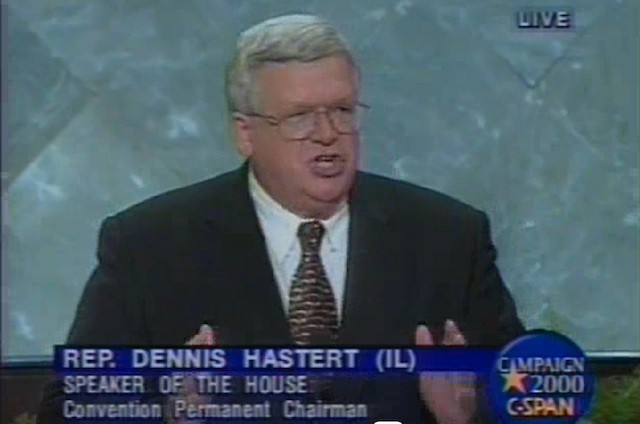
Next came what was apparently the first timestamped liveblog wise-ass remark by a lower-rung journalist about a nationally televised political event. This will probably make you feel kind of patriotic:
7:23 p.m. ET — There’s video of a fat guy dressed in olde 18th Century clothes, introducing the not-as-fat House Speaker Dennis Hastert, introducing the night’s nonsense via videotape or remote camera.
7:24 p.m. ET — Fruity GOP guys in wigs and costumes, via videotape.
7:25 p.m. ET — They found a black Republican (three, reports say) and he’s the first human speaker. He may be the last. CNN says this shows the GOP’s “new commitment to diversity.” There are no visible minorities among the delegates and guests on the floor.
You ever see those old clips of Johnny Carson or Al Jolson or whatever and think, “Meh, that’s not even funny”? Kind of the same thing with this stuff.
If I recall correctly, exactly two colleagues sent email remarking on the oddball blog post. One liked it, one didn’t understand it at all; both referred to the thing as an “article.” The time was not yet right. Four years later, when Kerry and Bush Junior had their conventions in New York and Boston, blogs were everywhere. A guy I knew from the Financial Times bureau in Silicon Valley had even started an actual publishing business with blogs. Everything was about to become wonderful, for everyone.
And tonight, Choire Sicha and I will COMPLETELY RE-INVENT LIVEBLOGGING FOREVER, so come back to The Awl at 6 p.m. Eastern, 9 p.m. Pacific. (JK, the other way around.) You will probably not regret this so much.
Today: Mecha-Streisand Takes Brooklyn
For Your Cats Only. Plus a salon about salons at MoMA and a fun party in honor of the ghost of Kingsley Amis.
Searching With Light: The "Hope" For The Next Thomas Kinkade
by Drew Dernavich
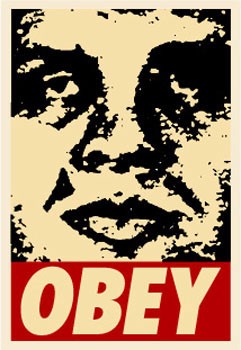
Last month we asked if Jon McNaughton was the right artist to take Thomas Kinkade’s place in American culture and decided that it was not a good fit: McNaughton’s much more concerned with ranting than actually painting. No, the next Painter of Light cannot be somebody with too many complex ideas. He needs to present something as familiar and easy to pull on as the cozy fall sweaters you’re currently pulling out of your dresser drawers. The work should be ubiquitous and unchallenging, suitable for Facebook. And if you support our current president you already may have clicked ‘like’ on the work of one such artist already, that is the “Hope” poster of the now-famous street artist Shepard Fairey. Salon called Jon McNaughton the right’s Shepard Fairey, but could it possibly be the other way around? Is Fairey the left’s McNaugton? Is Fairey the left’s Thomas Kinkade?
if you live in a city, there’s a good chance that somewhere not far away there’s a little greeting-card-and-tchotchke store filled with kitschy Kinkade merchandise. And there’s also a good chance that near this store there’ll be a street sign populated with Fairey’s stickers. Depending on your cultural orientation, you may tend to notice the one and not the other. But Fairey’s André the Giant images and certainly his “Hope” poster are as iconic and recognizable as Kinkade’s cottages. And what, exactly, do they mean? Nothing. Or everything, whatever you want. As we’ve noted, Kinkade was visual Splenda: no story, no substance, all atmosphere. Fairey’s work is not so different. The stylized face of the cult 1980s wrestling figure with the admonition to “Obey” is a page right out of the Dada playbook in that it’s essentially meaningless. Fairey’s message is solely in the method: put art where you’re not supposed to! Redefine your environment! Subvert the establishment! Or not. Where the Dada artists used absurdity to make a point, Fairey only uses it to strengthen a brand.
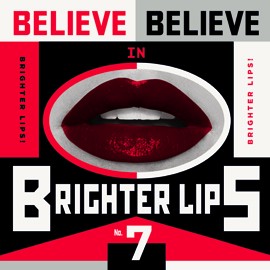
There are many people who have accused Shepard Fairey of becoming a sell-out. The truth is, though, that he’s never not been a sell-out, because by trade he’s a graphic designer. His job is to make stuff look cool, which he does spectacularly well. Like Kinkade’s, Fairey’s fantasy world is also one that doesn’t exist. His aesthetic is an ubercool mashup of Soviet propaganda, Eastern textile patterns, and American psychedelic and pop art. Whether or not he was really guilty of a “fair use” violation with the Obama poster is another discussion entirely. His work is a pastiche, a “statue with blank eyeballs,” in the words of Fredric Jameson, in that it randomly cannibalizes historical artifacts and reference points, intentionally stripping them of their original contexts in the service of visual “spectacle.” Remember when Nike used the Beatles’ “Revolution” in a TV ad (and, even more ironically, when they re-recorded a version of Gil Scott-Heron’s “The Revolution Will Not be Televised?”), tipping off the era in which alluding to counterculture is now the de rigueur marketing strategy of Honda and Apple and any number of luxury brands? That is essentially Fairey’s genius, staking out a style that makes sense on the street and on a Saks bag. His 2010 show which closed out Deitch Projects in New York almost looked like a “Greatest Revolution Hits” as curated by Spencer’s Gifts: John Lennon, Patti Smith, Jimi Hendrix. The only thing missing was the velvet. It’s a nice have-your-cake-and-eat-it-too position, not so unlike being able to call a painting an “original,” because it’s been “highlighted” by a mall employee (sound familiar?). To underscore the similarity between the two, here’s a list of companies that, at one time or another, employed either Kinkade or Fairey. Can you guess which artist worked for which corporate giant? (Scroll down to the end for the answers.)
1. Turner Entertainment
2. Disney
3. Coca-Cola
4. NASCAR
5. Dick Clark Productions
6. FOX Studios
7. Johnson & Johnson
8. Paramount Pictures
9. La-Z-Boy
Despite the differing voting patterns of their fan bases, the two artists are more similar than they are different. They’re the twin offspring of Warhol, who said that “good business is the best art.” You could argue that both are panderers in that they capitalize on existing, market-tested assumptions, selling them back to the audiences that want them the most. But even more interesting is the uneasy relationships both artists have with those ostensible audiences. Surely, many Christians observed that Kinkade’s relationship to his Creator often seemed less significant than his relationship to the bright golden calf, and Fairey’s supporters have sniffed more than a whiff of opportunism in his progressive impulses — after all, it’s not like he was out there designing posters for Dennis Kucinich. Hope or Light? You choose. But they both look good over the sofa.
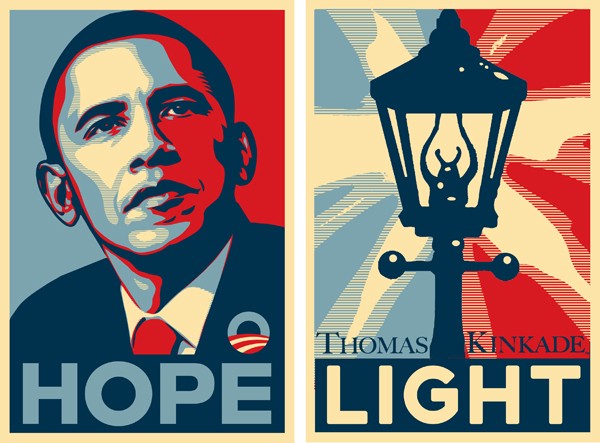
Answers: 1. Kinkade 2. Both 3. Fairey 4. Kinkade 5. Fairey 6. Fairey 7. Fairey 8. Fairey 9. Kinkade
Previously: Searching With Light: Is Jon McNaughton The Next Thomas Kinkade?
Drew Dernavich is a cartoonist for the New Yorker magazine (not that cartoonist — the other one) and the co-creator of the cartoon improv show Fisticuffs! He is on Twitter.
Microsoft To Become Cool, Too

It helps to be “cool,” in this world. Apple is cool! Barack Obama is/was cool, too! But not Microsoft. It is nice that Bill Gates is saving the world from diseases, but that doesn’t make kids want a Zune. That’s why Microsoft investors are very excited about CEO Steve Ballmer making the company’s offerings cool. The band Weezer played a Microsoft store in a Virginia mall, so that’s something. Hip hop and skateboards could be next for the software giant.
Mat Honan writes at Wired’s Gadget Lab:
But what is cool? When it comes to technology products, cool is typically something with a beautiful design that works well, does unexpected things, and makes life easier. Something that is not only innovative but that also engenders further innovation — something that lets the people who buy it create wonderful new things. The iPhone is cool. Twitter is cool. The Kinect is cool. And the Surface? Assuming it actually works, it looks very, very cool. Even Microsoft’s UI, the design language formerly known as Metro, is gorgeous and fun. People will build amazing apps that take advantage of that interface. Again, cool.
“The Surface” is Microsoft’s new plan to replace all flooring in the world’s buildings — homes, offices, hospitals, everything. Then you can just lie down on the floor and connect, in whatever way feels right. Imagine everybody on the floor, forever. Very very cool.
No, that is probably not true. The “Connect” is an iPad, as far as we can figure. Everybody loves iPads!
Your New First Lady's Sexy Fashion Secrets
“He has very definite tastes. He likes a waistline, and he likes her to show her figure off. He’s always staring her up and down and smiling. They’re like two kids who just met. They’re really adorable.”
— Ann Romney’s favorite designer tells New York what gets Mitt hot, and whether Ann wears magic underwear beneath her strapless gowns.
New York City, October 9, 2012

★ Monotonous but impotent. A dream of being tonsured faded into a dawn of cold seeping through the windows and the open-frame headboard, to the crown of the head. Outside was gray and a fine, irritating drizzle, drizzle, drizzle. Almost not there, yet everywhere. Wind rattled the plastic sheeting taped around a mattress standing upright by the curb. The drizzle and the low light and the cloudiness of the plastic made it impossible to tell whether it was an old mattress or a brand-new one. At dusk it was drizzling again, or still, whichever. The droplets were invisible except where they passed through the headlights of a cab, turning right, forcing its way through a full crosswalk.
Phil Lynott's Mom Is Awesome
“I listen to his music every single day. I also visit his resting-place every day because it’s only round the corner from my house. I go around and I pour water on his stone — I call it washing his face — and then when I’m leaving I give him a kick, for breaking my heart.”
— Public Radio International has a very touching interview with 81-year-old Philomena Lynott, the mother of Ireland’s greatest rocker, Phil Lynott, who died of a heroin overdose in 1986. [via]
Ask Polly: Should I Bring A Baby Into This Messed-Up World?

Appearing here Wednesdays, Turning The Screw provides existential crisis counseling for the faint of heart. “Sit down and wipe off your face!”
Hi Polly.
Alas, the sticky question is whether or not to enlarge our (human) household. My wife and I are both scientists and thus pessimistic by nature, which seems antithetical to the whole process of having and raising a child. In spite of that and after a great deal of talking and thinking, we decided to give it a try. Attempts were initially successful, but then took a tragic turn. And now, months later, after things have returned to “normal,” the decision is once again looming, seemingly more difficult than before.
My question — how did you make this decision? On the one hand, thinking about having a child seems incomprehensibly magical, albeit in an absurd and bizarre way. A person appears out of thin air, takes over your life and leads you in directions you’d never have thought to go. On the other hand, if I pick up John Gray’s Straw Dogs, as I did this week, I can’t help feeling as if I’m further dooming the human race by adding one more to the ranks. On top of that, there’s the possibility of ever-more-tragic turns. My wife has similar thoughts. How to resolve this? I don’t want to be overly paranoid and fearful, but having a child is about as serious a thing as there is. I realize this isn’t a particularly novel question, but I’ve found it’s often one that people cannot or are unwilling to answer honestly. Thus, I turn to you. What was your thought process? Were you racked by these doubts of doom, both planetary and personal? How did you resolve it?
Hesitant to Procreate
Dear H2P,
Doom doesn’t rule my thoughts about kids so much as it rules my thoughts about running out to the grocery store. But it’s funny that you mention it, because lately I’ve been reading The Road by Cormac McCarthy, god fucking knows why, and now all I think about every night before I go to bed is how horribly bad I’d be at protecting my kids in the case of an apocalypse. Walking through the snowy woods without shoes, feeling hungry and weak, aiming a gun at people’s heads so they don’t eat my kid? Trying to convince my kid that starving for another day is worth it? Reading this stuff makes me want to stockpile morphine, not C-rations and ammunition. I’m not cut out for anything but a climate-controlled, antiseptic, spoiled existence. Hell, I’m not even cut out for that half the time.
Some days, this stuff drags me down into the emotional cellar (where I have no canned peaches stocked). I mean, who even has the intestinal fortitude to read something like The Road, let alone write it? Maybe I’m just old and fragile, but that book offers a brand new existential crisis on every other page. “Do you think that your fathers are watching?” McCarthy writes, when things are going from worse to unthinkable. “That they weigh you in their ledgerbook? Against what? There is no book and your fathers are dead in the ground.”
Motherfucker! This guy’s prose is transcendent, but his outlook is devoid of all meaning or promise beyond the concrete fact of survival.
On the other hand, the concrete fact of survival is something. Because any time I’m tempted to slip down some bleak little rabbit hole, someone needs a sandwich. Somebody’s socks feel scratchy. I make a sandwich. I look for less-scratchy socks. Then I read a story about a duck whose pushy aunts come to stay with him for a few days and drive him crazy.
The Road presents an extreme story about surviving while in a vacuum of good reasons to survive. The guy in The Road only wants to live because he’s keeping his kid alive. I don’t know what my life adds up to half the time. But I put some music on the stereo, and my kids automatically start dancing. Should I be worrying about the apocalypse instead?
I appreciate your very sensitive nose for impending doom, but even if things get a thousand times more bleak, you still have no choice but to sally forth against the tide. You can put your worries about the planet into action and support the causes that might make a difference, sure, but while you’re at it, there’s something to be said for turning off the bad thought patterns and tuning in to the good things around you. Sometimes that means getting as focused and granular about the beauty in your life as you typically are about the ugliness.
Obviously there’s no worse time to contemplate the perils of child-rearing than right after a miscarriage. That’s exactly the sort of experience that can throw you into a doom-flavored black hole. But try very hard to turn it off for one night. Go out to a really nice restaurant with your wife, order a good glass of wine, and talk about your hopes for the future. Hopes, not fears. It’s not unfair to feel grateful, or hopeful. Why the fuck else are we alive? What if the world ended, and starving people with knives were hunting you down, wanting to eat your face off? You’d have to find some scrap of hope, somewhere. And anyway, the world isn’t ending. You’re just fine, and you’re going to have a good life if you can just take a leap of faith and stop worrying about the many, many terrible possibilities.
You want someone to be honest with you about kids? Having kids is the absolute best. It’s satisfying and funny and exciting and only occasionally terrifying, and if you’re smart, you adapt. You learn to block out the constant worries and fears about it most of the time. Kids remind you how to enjoy yourself. They’re a pain in the ass, but they demonstrate the right way to live, too, day in and day out. My prediction is that, in a year or two, you’ll look back at this time and you’ll say to your wife, “I’m glad we didn’t give up.”
Good luck.
Polly
Dear Polly,
Every few weeks, everyone I know gets on my nerves. I’m sure it’s partially hormonal, but I’m irritated to the point where I can barely stand to be around people.
I think because my parents both had major superiority complexes and thought they knew everything about everything, I’ve inherited the same shitty attitude. So whenever I feel down, I look around and feel annoyed with my friends. I wish everyone would stop bullshitting each other and tell the truth for once. I am impatient with the whole world. Everyone is so dull and so completely full of shit.
But I also feel like such an asshole. No one else I know is as much of an asshole as I am. Why can’t I just be patient and stop feeling so pissed off all the time?
Fed Up
Dear Fed Up,
Smart, complicated, crazy people are typically assholes, whether publicly or just on the sly. They feel superior, they feel guilty, they feel angry, they feel like they’re doing everything the wrong way, and then they feel like everyone else is doing everything the wrong way.
Now, from what you’ve written, I’m not sure if you’re angry at your friends because 1) they’re all just as complicated and confused as you are, and so they’re pretty self-involved and high-maintenance and not all that in touch with other people’s experiences or emotions, which makes them pretty fucking tedious on the whole; or 2) they’re simpler and less confused and possibly even happier than you are, which pisses you off not only because you can’t relate to anything they say, but also because you feel quietly judged by them for being relatively negative and pensive. Do you get accused of “thinking too much”? Are you urged to keep things simple in situations where that seems not just inappropriate but flatly bizarre? If so, it may be that you’re struggling to remain friends with people who have trouble understanding you, and who are going to tend to find your perspectives needlessly layered and convoluted and melodramatic.
But you also have to keep in mind that, since your parents thought they were right about everything, they were prone to telling you that you were wrong about everything. In order to be in a conversation with them, you had to either accept that you were totally wrong, or fight them and assert that you were right (about everything) and they were wrong (about everything). As a result, whenever you feel ever so slightly annoyed with someone, instead of thinking, “Oh, Mary is different from me,” you think, “Mary is wrong, wrong, wrong about this.” Then you feel superior. Then you feel guilty. Then you think, “I suck.” Then you think, “Fuck that. Mary sucks.” In other words, you’re thrown into conflict every single time you experience a negative emotion, probably because your parents demonstrated that there’s no mild, reasonable way to communicate when you’re slightly annoyed. If you had negative emotions about anything, that was bad and you, in turn, were bad.
As a fellow asshole, I would like to encourage you to tolerate the fellow assholes in your life (recognizing that they’re similar to you in many ways, even at times when they’re acting the most self-serving or unreasonable). If you don’t know anyone who’s anything like you, though, you should look around for someone who is. These new friends don’t have to be wildly unhealthy, mind you. You’re looking for high-functioning former crazies, or sane people from crazy households, who understand crazy and accept it without, say, quitting their jobs to do heroin around the clock.
Before you hit the road in search of new friends, though, you should do some work on accepting yourself with all of your flaws. Give yourself a break. Most people are much more conflicted than they appear. If you feel guilty every time you feel anything negative, you’re naturally going to turn that guilt into defensive anger at others for not being more like you. You need to practice accepting the real you — the weak, angry, asshole you — and recognizing that that person isn’t that bad, or that uncommonly evil. You’re just a person. Maybe you’re trying to seem a little bit better than you are. (Trying to be better is worthwhile. Trying to seem better can be problematic, because you’re selling the world an alternative version of yourself that you have trouble living up to.)
As you accept your own weaknesses, try to show yourself a little bit more, and you may see that people don’t recoil, they’re actually interested in who you really are. Moving towards a more genuine self also has the benefit of breaking you out of the defensive, egocentric state you’re in. Because, whether or not you’re in need of new friends, one thing is clear: You’re not really listening closely or engaging completely. Allowing people some space to talk and be themselves, without getting judged, is a good way to stop being bored by them. The more you accept who you are, the more interesting you’ll find other people, whether they’re exactly like you or completely different. Because your long-term goal is not to surround yourself with people who match you — that’s just an intermediate stage in the game, meant to pull you out of this self-loathing phase. The ultimate goal is to be able to appreciate and enjoy the company of a wide range of friends. Truly happy, high-functioning people, whether formerly crazy and complicated or not, share this ability to enjoy difference, because their egos and their need to be unconditionally adored aren’t always blocking the way to taking people and experiences as they come.
But even these superhuman types are assholes now and then. We all are. So stop beating yourself up over it.
Polly
No problem is too small, no crisis too minor for Polly! Write to her now and watch all of your tiny troubles melt away, or at least appear tinier for a few seconds.
Previously: Ask Polly: I Can’t Get Over This Crush
Heather Havrilesky (aka Polly Esther) is our new existential advice columnist. She’s also a regular contributor to The New York Times Magazine, and is the author of the memoir Disaster Preparedness (Riverhead 2011). She blogs here about scratchy pants, personality disorders, and aged cheeses. Photo by p-a-t-r-i-c-k.
